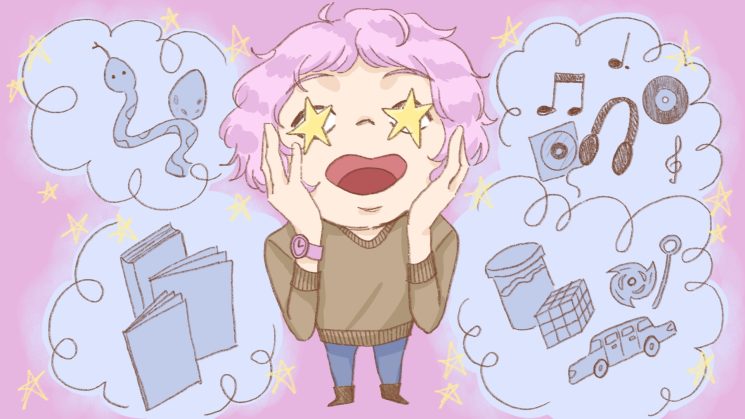
By Caroline Mora
I love snakes. I have been to a reptile convention two years in a row, and I have visited a reptile zoo more times in the last three years than in my whole life. I binge-watch videos of snake breeders and owners creating content such as feeding videos, different types of snake morphs, what they eat, where they live outside of captivity and why some colubrids eat bird eggs.
I know quite a bit. This is my obsession.
One of many.
A lot of people hear the word “obsession” and immediately equate it to something unhealthy, conjuring up images of addiction, stalkers, perfectionism and compulsions.
When I think of obsessions, specifically those that are attached to a hobby or topic of interest, I think of a network of like-minded individuals sharing their opinions and discoveries.
It’s an uplifting and hopefully comforting image. I’ve been fortunate to have found it in different groups throughout my life. Whether it be online communities or something more social, the feeling of sharing an intense interest or obsession with another person is a type of connection that feels unique and different from other relationships.
There are many mental and social benefits to having an obsession or two. There are unhealthy and truly negative parts to obsession as well. But, I believe that with the right interest, having an obsession can make you a better, happier person.
What makes an unhealthy obsession?
Unhealthy obsessions, as much as we don’t like to think about them, do exist. Obsessions that revolve around people or an illegal substance aren’t good. If your interest interferes with daily tasks and causes you to isolate yourself from your friends and family, it might not be in your best interest to continue pursuing this obsession.
Obsessions can sometimes create distress or anxiety; if your anxieties revolve around what might happen if you don’t do something, these are called compulsions and are associated with Obsessive Compulsive Disorder (OCD). You should think about consulting a doctor if you exhibit behaviors of OCD.
What makes a healthy obsession?
A healthy obsession is something that makes you smile. It makes your day brighter and increases your productivity. For instance, you could have an obsession with cleaning. As a result, you would watch TikTok videos about what products are best for cleaning while learning how to be a sustainable cleaner and this effectively makes you want to clean your environment.
This hobby could also be something that provides a healthy outlet for your emotions or it can act as a way for you to de-stress. To illustrate this, if you are an obsessed crocheter, due to the repetitive nature of this hobby, you can use crocheting to calm yourself down and decompress after a long day.
Your hobby should be something that encourages you to join a new community, or just meet new people. You could have the most niche hobby in the world, and there will still be others who share the same interests as you.
Finding the balance
It can be hard, at times, to distinguish between healthy, and unhealthy obsessions. Unhealthy obsessions can make you feel happy, but even if you’re happy, if it’s hurting your lifestyle or harming your body — it can’t be good for you.
The new community should be uplifting, light-hearted and fun. Remember, there are many different social circles for the same thing. If you meet one group and you don’t vibe with them, that’s okay, because you can find a new group where you feel more comfortable.





